- Home
- H A CULLEY
The Bastard's Son Page 6
The Bastard's Son Read online
Page 6
Hugo turned to Roger, ‘Two of my knights are Saxons – Sweyn and Wulfric. Perhaps they could enter Wooler without arousing suspicion and then kill the sentries and open the gates so we can enter and take Ebbe and his men by surprise.’
‘They might not even bother with a guard on the gate at night, once they are shut and secured.’
‘Good, once we have control of Wooler, the rest of your manors should be easy to take over, and I can make a start on mine with Akeld. Then we can expand into the Cheviots from there,’ Hugo summarised, though he wasn’t entirely happy with the way things had turned out.
Securing all of De Muschamp’s properties before he tackled his own manors hadn’t been his original intention. He was worried that, once Roger had started work on his castle at Wooler and began to manage his estates, he wouldn’t have any men to spare to help him. However, he had agreed to the plan so that was that.
-X-
Sweyn and Wulfric had no problems entering Wooler dressed as peasants with a cart of produce to sell. Hugo and the rest of their small force had occupied a hamlet in the hills above Wooler and held the inhabitants prisoner. They were well treated and, once they were assured that they would be released in due course, they co-operated. The greybeard in the corner of one of the hovels they lived in was an exception, but his son told them that there was a weekly market in Wooler and sold them a cart full of produce to take to it.
They noted that there were three sentries on the gates but they gave the two disguised knights no more than a cursory glance. There was another man in the tower beside the gate and he did seem to be paying more attention to his task of watching the approach to the town. All four appeared to be normal townsmen armed with a spear and shield, not housecarls.
They made their way through the narrow, muddy streets strewn with filth to the open area in the centre of the town where others were setting up their stalls. Wooler was built on the side of a hill and the market square was the only flat piece of land of any size. They tried to estimate the size of the population from the number of houses and came to the conclusion that there were probably between five and six hundred. Of these three quarters were likely to be women, children or old men. That meant a hundred and fifty men of fighting age at most.
As they started to sell the cart’s contents they saw four housecarls moving through the stalls and laden carts examining what was for sale, throwing some down in the mud if they rejected it or taking it without paying if they liked it. One man protested and got a fist in his face. He sat down sharply, spitting blood and a broken tooth out of his lips, which had been cruelly cut in several places by the chain mail gauntlet covering the housecarl’s hand. Wulfric went for his dagger, but Sweyn put a restraining hand on his arm.
The housecarls barely gave their cart full of vegetables a glance but one of them selected an apple from the next door cart before moving on.
‘I shan’t have any compunction about killing those pigs,’ Wulfric whispered to Sweyn. He had kept his voice low, but a boy of about twelve helping to man the cart with the apples must have had extremely acute hearing. He gave the two Saxons a strange look and then came up to them.
‘If you’re going to kill those thieving bastards, can I help you?’
‘Sorry, lad. You must have misheard,’ Wulfric said, giving Sweyn a worried glance.
‘It’s alright. I shan’t betray you. I hate them; they’re Danes and I’m a Saxon.’
‘So are we!’ Wulfric replied in surprise.
There were very few Saxons as far north as this, or so he had been told. There was a small enclave around Bambrough, but that was it.
‘My mother came from Bambrough - she’s an Angle – but my father is a Saxon so I suppose I’m an Anglo-Saxon really. My name’s Godric, by the way.’
Wulfric was amused by the boy’s precociousness and had rapidly come to the conclusion that he was genuine; and could be trusted.
‘How old are you Godric?’
‘Thirteen; I’ll be fourteen soon. My father is never too sure when I was born but it was sometime in May he says, because the blossom was out.’
The two knights looked over at the man on the next door cart who was serving a customer. He looked quite old to have such a young son.
‘I take it that you aren’t the eldest?’
The boy laughed. ‘No, I’ve got three elder brothers and two sisters, both of whom are now married. Father and my brothers work in our orchards. I try to help but they say I’m useless.’
‘He is too. He eats more fruit than he picks!’ his father called across to them. ‘I’ve a good mind to send him to Durham as a novice.’
The boy visibly paled. ‘I’d run away before I’d become a monk; I’d be more use as a soldier. Jarl Ebbe demands we pay him a quarter of all we produce, despite the fact that my father holds a charter proving that he is a churl who holds his land directly from the old monastery on Lindisfarne before it was destroyed.’
‘But that was over two hundred years ago!’
Sweyn realised that he’d made a mistake as soon as the boy’s eyes widened in surprise. Even the boy’s father probably didn’t know when the monastery was abandoned after repeated attacks by Norsemen centuries before. He only knew because Bishop Ranulph had told Sir Hugo and Hugo had told his men the brief history of their new homeland.
‘How do you know that?’
Both the boy and his father now suspected that the two knights were not the simple farmers they claimed to be.
‘I was told by a monk who was travelling from Durham to Lindisfarne to see what remained of the old monastery.’
That was partially true. There was a monk accompanying the bishop’s conroy who was tasked to do exactly that.
‘Are they thinking of rebuilding it?’ the boy’s father asked.
‘I gather so.’
‘All praise be to God! Perhaps the prince-bishop will send some soldiers north to rid us of these Danish oppressors,’ he added with some vehemence. He smiled at them. ‘My name is Carsten by the way.’
Sweyn looked at Wulfric, who nodded.
‘I take it you’d be happy if someone was to rid you Ebbe and his housecarls, Carsten?’
‘Of course, but that’s not very likely is it?’
Wulfric looked around him but no-one seemed to be paying them much attention.
‘Perhaps it’s more likely than you think,’ he whispered back. ‘This is part of King William’s kingdom now.’
‘Apart from rampaging through it, he hasn’t done much for us, has he? We want the old Kingdom of Northumbria back, but ruled by the Angles, not the bloody Danes.’
‘That ship has sailed. You’d be better off under Norman rule than that of a savage like Ebbe. You would be a tenant of the prince-bishop’s and therefore only liable to pay a tenth of your income, not a quarter, to the Church.’
‘That’s true; if the Church honoured the old charter.’
‘Durham is the mother-house, regardless of whether the bishop is a Norman or a Saxon.’
‘I suppose so. How do you plan to topple Ebbe then? He’s a very dangerous man and I won’t be involved in any hair-brained scheme dreamt up by a couple of mad Saxons.’
So Wulfric and Sweyn told him.
-X-
The four of them booked a room in cheap tavern that evening. By that time they had sold all the produce that they had brought into Wooler. Most who lived outside the town couldn’t afford to stay there overnight after the market but Wulfric, being the senior knight, had been given a purse of small value coins by Hugo. He wasn’t being mean; a poor peasant with a bagful of silver would immediately have aroused suspicion. A freeman staying in a tavern was not that remarkable and the two knights pretended to be Carsten’s villeins.
At midnight the three men climbed out of the window onto the sloping roof of the single-storey brewhouse and dropped down into the courtyard where their carts had been parked. Godric had been given clear instructions to stay behind in the room and he
made no secret of the fact that he was pissed off not be included.
Sweyn and Wulfric retrieved their swords, which had been hidden under the seat in the cart, and they made their way to the main gate, keeping in the shadows as much as possible. As it was a new moon and even that was hidden behind clouds most of the time, there was little to illuminate them apart from the odd sliver of light from a candle spilling out between poorly made shutters. Luckily Carsten knew the way in the dark as the two Saxons readily admitted they would have soon got lost.
Suddenly Sweyn, who was at the rear stopped and tapped Wulfric on the shoulder to warn him. They both heard the soft shuffle of someone following them but, in the dark, they couldn’t see who it was. Wulfric turned back to tell warn Carsten but he was no longer there. He’d gone on, not noticing that the other two had stopped. Wulfric pulled Sweyn into a narrow alleyway and they waited as the soft footfall grew nearer. Wulfric quietly pulled his dagger out of its sheath and, as the shadowy figure passed the alley, Sweyn grabbed him and put a hand over his mouth whilst Wulfric put his dagger to his throat. It was only then that they realised that the person following them was just a boy and it didn’t take a genius to work out which boy, even in the dark.
‘Godric?’
Their captive couldn’t speak with Sweyn’s hand over his mouth but he felt the boy try to nod, so he removed his hand cautiously, ready to clamp it back again.
‘I’m sorry. I just didn’t want to get left out of the fun.’
‘This isn’t some sort of game, you idiot!’ Wulfric whispered fiercely. ‘Now your father has left us behind and we don’t know where we are, thanks to you.’
‘That’s not a problem. I can take you to the main gate,’ he said eagerly.
The two Saxons set off again following Godric and five minutes later they arrived at the gate. They watched from the shadows and counted just two men, both wearing hauberks and so were presumably housecarls. Both sat on stools with their helmets beside them. They were illuminated by a small brazier which they had placed in front of the closed and bolted gates. They seemed oblivious to everything as they drank beer and played dice. Wulfric and Sweyn silently slid their swords from their scabbards and, telling Godric to stay where he was, they ran across the few yards separating them from the housecarls.
The two men were hardly aware that they were being attacked before the two knights thrust their swords into them; one into a throat and the other into an eye socket. Neither man managed to cry out before they were killed. Suddenly another man appeared and Sweyn had to knock Wulfric’s sword aside to prevent him killing Carsten.
‘I thought I’d lost you..,’ he started to say but Wulfric cut him off.
‘Help us get these gates open.’
The three men and Godric hauled the heavy gates open and Sweyn lit a torch in a nearby sconce from the brazier. He waved it to and fro three times and then waited. Two minutes later Hugo appeared with the rest of the men. After quickly congratulating them, Carsten and Godric were introduced.
‘I’m leaving the Durham conroy here to hold the gates. Sir Roger and I will take the rest up to the hall house and kill Ebbe and his men. Then we’ll wait until dawn before summoning the townsfolk to the square to tell them that they have a new master.’
-X-
It had been remarkably easy. The housecarls were all asleep, most in a drunken stupor, and there were no sentries. Hugo let Roger have the pleasure of dealing with them and his mesnie made short work of the eight men. Most were still asleep when they were killed and those that did wake up were in no fit state to offer much resistance.
The few servants sleeping in the hall fled, sobbing in terror, and the noise brought Ebbe to the door of the solar. He was naked but brandished a battle axe. He stood there for a moment defying all and sundry to come and attack him; the look of astonishment on his face as a crossbow quarrel put an end to his posturing was almost comical.
Word spread through the town immediately. The bishop’s men had secured both gates and the few that tried to leave were turned back. Most, however, seemed very happy that Ebbe and his bullies were no more. Roger found a terrified girl who looked to be about twelve hiding in the solar and his squire took her back to her parents once she was dressed. They were quite emotional in their thanks for her safe return. However, their joy was tinged with regret that she was no longer a virgin and thus finding her a husband would be difficult.
The inhabitants gathered in the main square at dawn and Roger de Muschamp climbed onto a cart as a makeshift rostrum to address the crowd. There were a few cheers and some called out their thanks for freeing them from Ebbe’s rule, but most were apprehensive about what now lay in store for them.
After Roger had explained who he was and that he was there to restore this part of Northumberland to the rule of King William Rufus a low muttering began and the knights and serjeants who ringed the square fingered their swords and crossbows nervously. Roger held up his hands.
‘Wait, hear me out!’ he shouted and gradually the angry murmurs died away.
‘This king is not the William who burned Berwick and despoiled the lands to the south of here, about which you will no doubt have heard. It is his son and the land is now at peace and prosperous with Saxon, Angle and Dane co-existing happily with one another.’
What he said wasn’t far off the truth. Life for churls, villeins and bondsmen was virtually identical to what it have been under the thanes and ealdormen. It was the thanes and nobles who had been dispossessed to provide estates for the new Norman overlords who had suffered most.
‘Ebbe took a quarter of what you earned or produced I’m told. That changes as of today. You will provide me with one day’s work a week, or the monetary equivalent for tradesmen and the like, as is the case throughout England. Your labour for me will cultivate my fields and build a wooden castle for me and my men to live in at the eastern end of the town. This will also provide a defence against the marauding Scots.’
At this the mood in the square began to change. The Scots were a perpetual problem and anything which helped them to defend their town was bound to be popular, even if it meant working to build it.
‘Tomorrow I will hold a manor court in the hall and anyone who has a grievance can raise it then. One last thing, who is your headman?’
A burly man wearing the leather apron of a blacksmith stepped forward.
‘I am, my lord.’
‘Good you will act as reeve until the townsmen can hold an election to either appoint you formally or select another in your place. I will also need a bailiff but that can wait for now.’
In fact it didn’t have to wait for long. Carsten could read and write well enough and a week later Roger made him his bailiff. He returned home to tell his eldest son that his orchards and other land was now his and then returned to Wooler.
Initially Herbert stayed behind to train Carsten in his new responsibilities. His son, Godric, asked to stay with Hugo’s mesnie and joined another boy as servants to his serjeants. Now that Wooler was secure it was time to think about the outlying manors.
Chapter Five – Harbottle
Summer 1089
The remaining manors in Glendale had quickly submitted to de Muschamp’s rule once they heard what had happened at Wooler. Roger had dealt swiftly and fairly with the numerous grievances brought before him, though it had taken three days to do so. Hugo, having experience in the construction of castles that Roger lacked, started the layout and foundations for the motte and bailey on the hillside overlooking Wooler Water. From the top of the tower on the motte there would be a good view across the plain to the north and down the valley to the south as well as over the small river.
Once work was underway, Roger set off with half his men, ten men from the bishop’s conroy and Hugo to visit his villages in Glendale. The bishop’s captain went to escort the monk to Lindisfarne to survey the ruins of the monastery that had once stood there and to make plans for the construction of a priory as a subordinat
e religious foundation to the abbey in Durham.
By the time they returned the period to which the bishop had agreed to lend his men was over and the conroy set off back to Durham. Hugo watched them go in frustration. De Muschamp had taken control of his manors but Hugo had yet to start on his. Furthermore, his lands lay in the wilds of the Cheviot Hills, which was much more difficult country to conquer than Glendale had been, as he found out when he arrived with his mesnie in Akeld.
The village was only a few miles from Wooler but it lay in the hills and it was deserted when he arrived there. Presumably the villagers had fled with their cattle and other livestock when they became aware of his approach. He had his own mesnie and three of Roger’s men with him. They started to follow the tracks left by the fleeing villagers but they split into two to follow two separate valleys up into the Cheviots. Hugo was reluctant to split his small force of twenty five so he followed the one that was most churned up. Half a mile further on that split too and Hugo began to think he was on a wild goose chase.
All the time he was being drawn into a wilderness that he didn’t know with too few men if he were ambushed. He decided to turn back and they spent the night in the deserted village. The next day they discovered a hamlet two miles north east of Akeld and here they had more luck. An old man had been left behind because he was too feeble to keep up.
Hugo treated him courteously and he shared the bread and cheese he had brought for his midday meal with him. Hugo tried to explain who he was and what he wanted but it was evident that the man understood neither Norman French nor the dialect of English spoken by the Saxons further south. When he sent for Godric Hugo had more luck. The man spoke Danish and Godric soon found out that he was the senior man in the hamlet. Surprisingly he was only forty two; he looked at least fifteen years older than that, but presumably he’d led a harsh life.

 The Wolf and the Raven
The Wolf and the Raven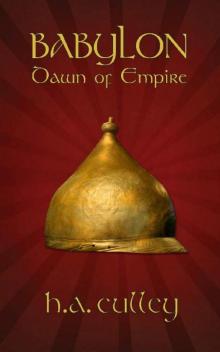 Dawn of Empire
Dawn of Empire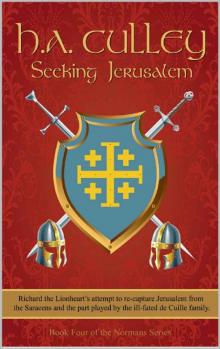 Seeking Jerusalem
Seeking Jerusalem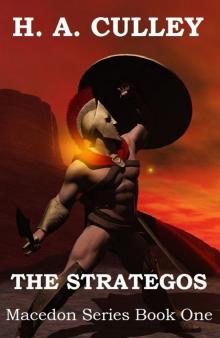 The Strategos
The Strategos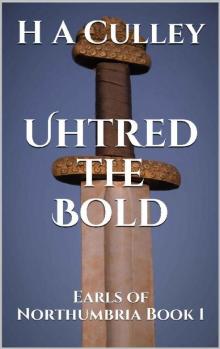 Uhtred the Bold
Uhtred the Bold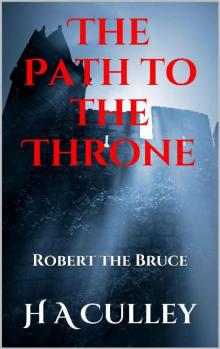 The Path to the Throne
The Path to the Throne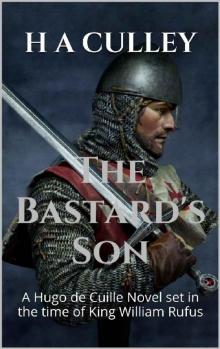 The Bastard's Son
The Bastard's Son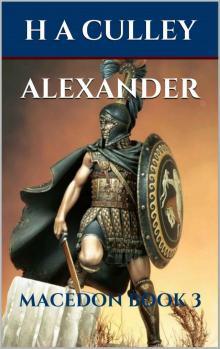 Alexander
Alexander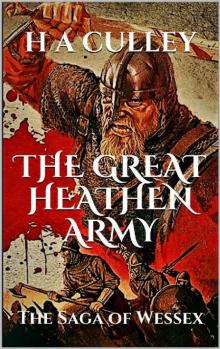 The Great Heathen Army
The Great Heathen Army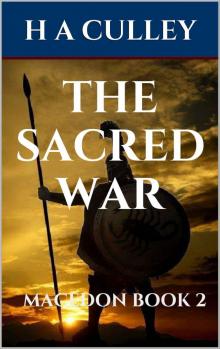 The Sacred War
The Sacred War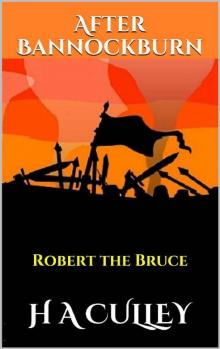 After Bannockburn
After Bannockburn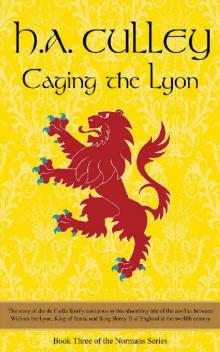 Caging the Lyon
Caging the Lyon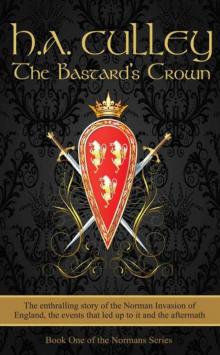 The Bastard's Crown
The Bastard's Crown WHITEBLADE
WHITEBLADE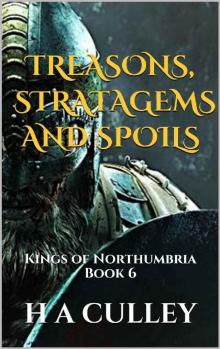 TREASONS, STRATAGEMS AND SPOILS: Kings of Northumbria Book 6
TREASONS, STRATAGEMS AND SPOILS: Kings of Northumbria Book 6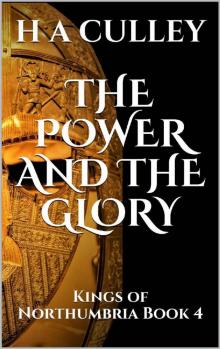 THE POWER AND THE GLORY: Kings of Northumbria Book 4
THE POWER AND THE GLORY: Kings of Northumbria Book 4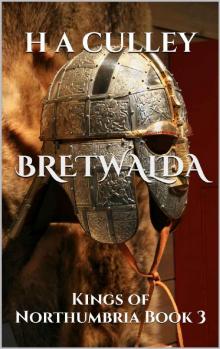 BRETWALDA: Kings of Northumbria Book 3
BRETWALDA: Kings of Northumbria Book 3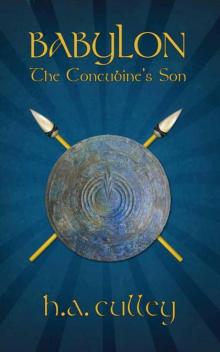 The Concubine's Son
The Concubine's Son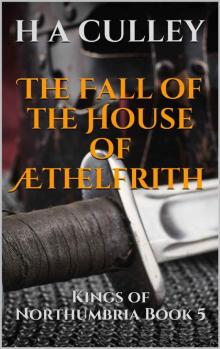 The Fall of the House of Æthelfrith: Kings of Northumbria Book 5
The Fall of the House of Æthelfrith: Kings of Northumbria Book 5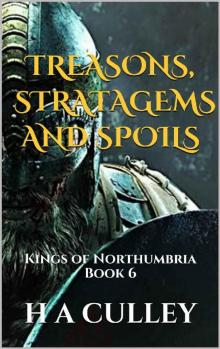 TREASONS, STRATAGEMS AND SPOILS
TREASONS, STRATAGEMS AND SPOILS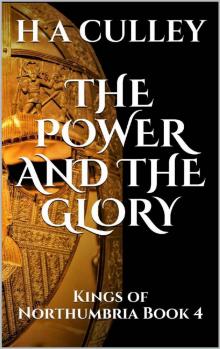 THE POWER AND THE GLORY
THE POWER AND THE GLORY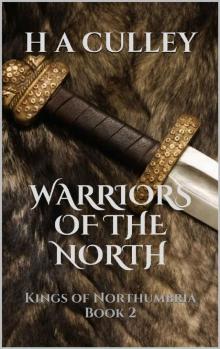 WARRIORS OF THE NORTH
WARRIORS OF THE NORTH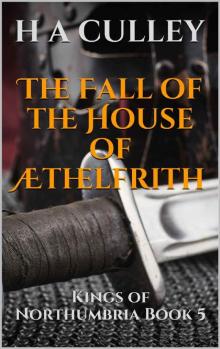 The Fall of the House of Æthelfrith
The Fall of the House of Æthelfrith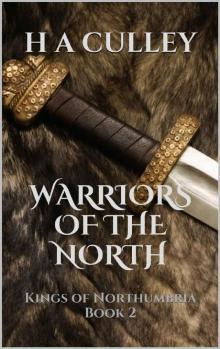 WARRIORS OF THE NORTH: Kings of Northumbria Book 2
WARRIORS OF THE NORTH: Kings of Northumbria Book 2 WHITEBLADE: Kings of Northumbria Book 1
WHITEBLADE: Kings of Northumbria Book 1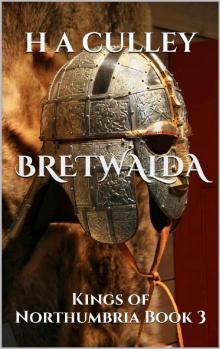 BRETWALDA
BRETWALDA